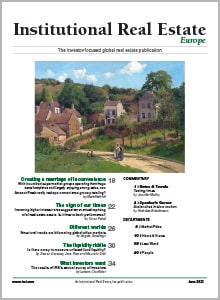What investors want: The results of IREI’s annual survey of investors
Investors committed more capital to real estate in 2021 than they had initially expected, and US investors expect to allocate even more to the asset class in 2022.

Investors committed more capital to real estate in 2021 than they had initially expected, and US investors expect to allocate even more to the asset class in 2022.
Liquidity is a well-known issue when investing in private real estate. A lack of liquidity deters some investors from participating in the asset class altogether, especially if their investment horizons are short, but it has less concern for others with longer investment horizons and who are prepared to maintain a strategic allocation.
The global office market is undergoing profound changes, driven by structural environmental, social, health and technology trends. Most pre-date the pandemic, and all have been accelerated by it.
As well as dominating the news headlines, the Russia-Ukraine crisis is also significantly influencing the economic, financial and commercial real estate outlook.
Europe’s grocers have emerged from the pandemic remarkably well. They largely reinforced their position as an essential service, their staff were frontline workers, and ecommerce penetration increased dramatically. While online sales have inevitably dropped off, the residual lift marks a step change in omnichannel grocery in Europe and the United States.
Catella Residential Investment Management has secured €280 million from seven German and Dutch institutional investors for the Catella European Residential III Fund (CER III) — the first pan-European “dark-green” ESG impact fund for residential real estate.
Germany is seeing a significant increase in new-build residential properties, as investors look to enhance their ESG credentials and fight off the threat of inflation to portfolios.
A large number of European pension funds believe real estate that falls short on sustainability will suffer from significant “brown discounting”.
More than half of retailers across Europe are estimated to be planning on expanding their store footprints over the next year.
European real estate investment markets are in a good position to deal with the “double trouble” of lower GDP growth and higher inflation.
Futurologist Matthias Horx famously characterised megatrends as “avalanches in slow motion”.
From the COVID-19 pandemic to Russia’s war on Ukraine, the world has seen its fair share of black swan events recently.
Between the fourth quarter of 2020 and the first quarter of 2022, euro zone CPI inflation increased from –0.28 percent to 6.16 percent — reaching levels last seen in the mid-1980s